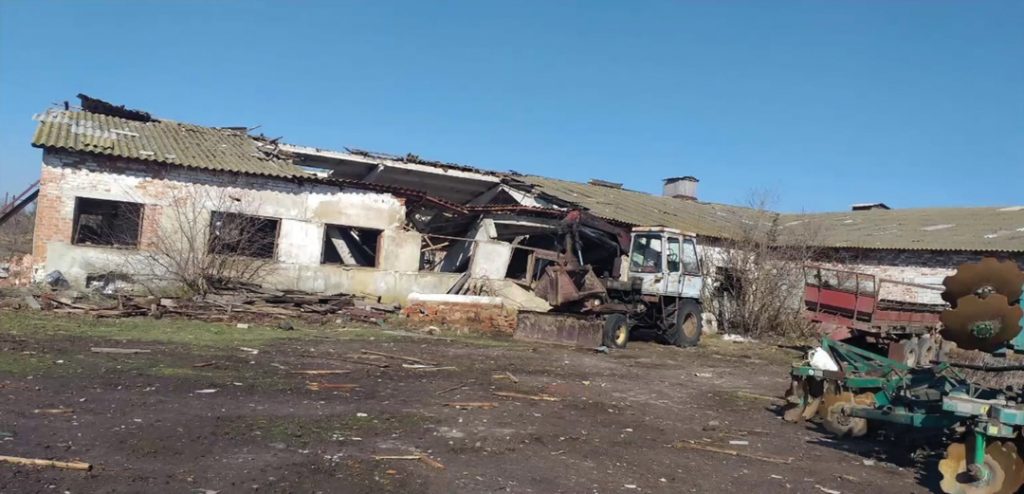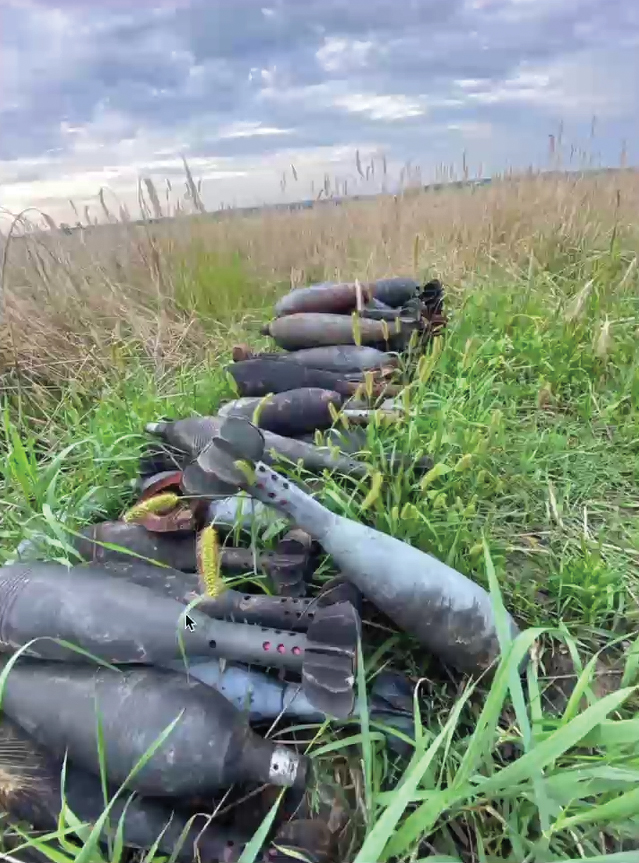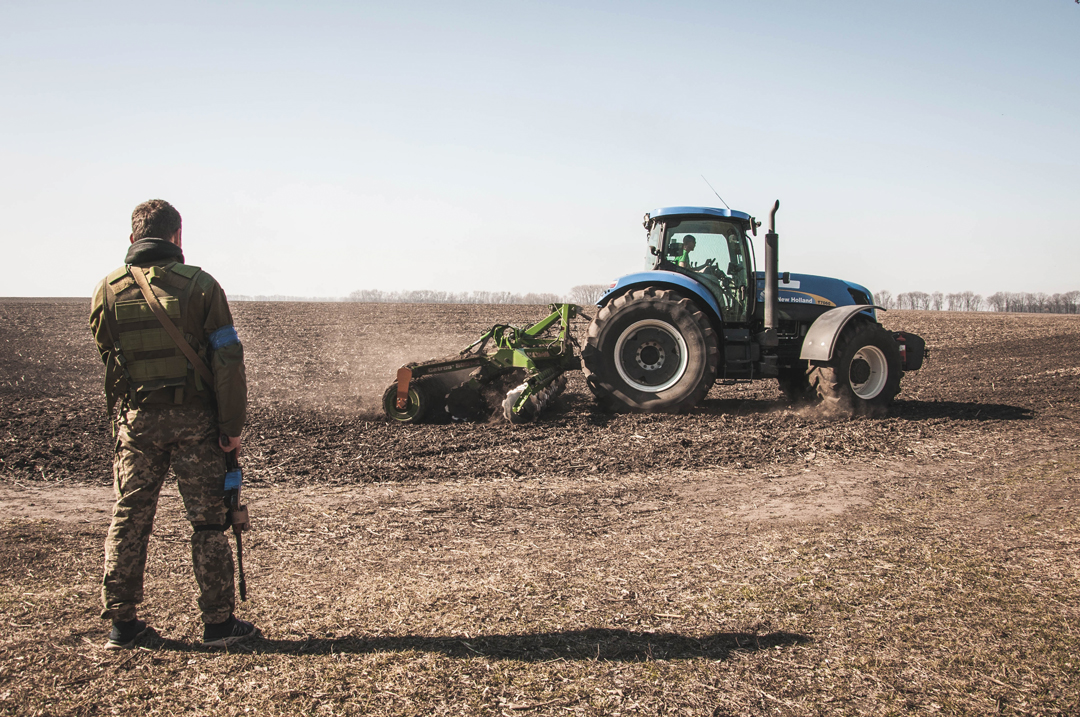WAR BONDS
BY MADELEINE BAERG • ABOVE PHOTO: SHUTTERSTOCK
The Russian invasion of Ukraine began on Feb. 24, 2022, resulting in thousands killed or injured, millions displaced and the destruction of urban and rural areas alike. This catastrophic escalation of the almost-nine-year Russo-Ukraine War has also devastated Ukrainian agriculture. It’s a brutal hit that will have long-lasting and far-reaching consequences within the country and across the globe.
As the fight rages on, Canadians have taken a lead role as the farming sector steps forward to shore up, rebuild and retain agricultural production in Ukraine. A portion of the effort is taxpayer funded. In August of 2022, the Canadian government committed $52 million for grain storage solutions for small- and medium-sized Ukrainian farms. This was intended for the purchase of polyethylene sleeves and longer-term modular storage units as well as related equipment and technical support.
Many Canadian initiatives aim to meet Ukraine’s needs quickly, effectively and in many cases, farmers are helping farmers. “Supporting farmers and farming in Ukraine is critical,” said Anastasia Fyk. “Supplying arms is one thing and obviously it’s needed in a war situation, but you can’t eat arms, you can’t eat money. Our goal with our project was to save people’s lives with food.”
Fyk helped co-ordinate the logistics of one of the earliest Canada-based aid projects, a last-minute, mad-dash effort to transport Canadian buckwheat seed to Ukraine in time for spring seeding.

Ukraine depends on buckwheat as a domestic staple and the country is typically an important supplier of buckwheat to multiple European and Asian countries. However, Russian shelling and burning of Ukrainian crops and grain storage facilities left farmers without adequate seed ahead of the 2022 cropping season. Faced with a time crunch, in early March, the Embassy of Ukraine sent an urgent plea to the Government of Canada for buckwheat seed. The federal government circulated the request throughout the agricultural community.
Garland, MB, farmer Don Fyk (Anastasia’s father) operates FYK Soba, a buckwheat processing facility. When he received the message, he realized he was uniquely positioned to help.
Though his own grain was pre-sold for processing, he scrambled to redirect buckwheat seed from other sources to the aid effort.
“Our grandparents came from Ukraine with some buckwheat seed,” said Don. “That’s how they got started with farming in Canada. The only thing we can possibly do is reciprocate in any way we can to help our ancestral homeland.”
Within five days of receiving the request, Don pulled the project together. The Canadian Ukraine Foundation jumped on board to help pay for the seed. Though Don waived his own costs, his contract farmers required payment. The Foundation took official charge of the seed, as shipping between humanitarian aid organizations minimizes Canadian Food Inspection Agency and sanitary certification red tape. Meanwhile, local group Ukraine Humanitarian Appeal covered the cost of seven shipping containers. Two weeks later, these were loaded and en route to Ukraine via Germany and Poland.
Six of seven containers arrived six weeks later, and the seed was distributed to 70 farmers in 10 regions who together planted a total of about 7,000 acres. The seventh container arrived too late for seeding in 2022, so its contents will be put toward seeding in 2023.
“How does it feel to do this? I don’t have words,” said Don. “It’s just the right thing to do. When there’s a call for help, you answer.” He hopes the buckwheat initiative continues in 2023 with greater lead time.
Canadian ag entrepreneur Rob Saik, CEO of AGvisorPRO, shares Don’s belief in stepping up to help the war-torn nation. “All of my grandparents, both paternal and maternal, came from Ukraine and all of them were farmers,” he said. “That makes me a Canadian with deep, deep Ukrainian roots. I’ve been fortunate to have visited Ukraine several times, working on the ground with farmers. So, when the invasion happened, particularly in Sumy Oblast where I had been, the attacks struck very close to home for me.”
Starting from the earliest days of the war, he reached out to colleagues, friends and acquaintances, primarily through social media, to raise aid money. To date, he’s collected more than $100,000, the majority through agricultural connections. A portion of these funds have been used to purchase equipment such as night vision goggles for Ukraine’s Territorial Defense Forces and to pay for supportive technologies such as satellite imagery, which has agricultural and defensive applications.
“My hood is the agriculture hood. When the war started, I turned to the agricultural community and said, ‘I have contacts in Ukraine. I cannot give you a tax receipt, but I can assure you whatever we buy will go straight into the hands of people I know and trust, and it’ll make a difference.’ The outpouring from the community—farmers and agricultural professionals—has been incredible. All sorts of people donated money.
“For me, it was about getting their country back,” said Saik. “I wanted every cent to go to help people on the ground, and I didn’t want any delay. The invasion happened February 24 and we were deploying capital by mid-March.”

One of Saik’s biggest concerns is that agricultural fields be demined. “The numbers are astronomical,” he said. “I’m not sure the degree to which an individual can make a difference there but I’m aware of certain initiatives and technologies that might happen. If they do, it would be an opportunity for us to raise some more money and make a difference on the ground again.”
Saik isn’t the only ringleader to drum up support. Early in the war, Vancouver-based EarthDaily Analytics launched a support coalition that has today grown to offer wide-reaching impact in Ukraine.
The data processing and analytics company and its agricultural subsidiary EarthDaily Agro use satellite imagery and data analysis tools to support predictive, precision farming around the world. In Ukraine, EarthDaily has partnered with Chernihiv-based AgriLab, an agronomy and precision farming company. When the war began, EarthDaily immediately offered its analytics and geosys platform services free of charge to existing customers in Ukraine, and soon after, to all its farmers. To date, hundreds of farmers have signed up and the platform is now used to manage nearly a million hectares of Ukrainian farmland.
“This is about purpose over profit,” said Andrew Mullin, EarthDaily Agro vice-president of marketing and lead on EarthDaily Analytics’ efforts in Ukraine. The company realized its existing connections uniquely positioned it to quickly deliver help where it was needed. It reached out to additional agricultural companies to build the Support Ukrainian Farmers Coalition. It has grown into a loose group of corporate, government and NGO partners that provide support to Ukraine’s agriculture sector.
“We’re a relatively small company but what we’ve been able to leverage is that we were on the ground in Ukraine before the war. We had relationships with the farming community, both large businesses like Kernel and small farms through AgriLab,” said Mullin. “Where we’re adding the most value is in offering a local connection as a way for people to get involved on the ground.”
“There are a lot of people and organizations who want to help but they’re just sort of daunted by the premise of setting up their own organization,” said Bryan Degnan, managing director of The IGB Group which supports EarthDaily in its Ukraine-related efforts. “We knew there was a well of goodwill. We’ve tried to figure out ways to pull people together and to point people in the right direction so that goodwill can get to where it is intended and people don’t just throw up their hands and say, ‘It’s too hard, I can’t do it.’”
Rather than control or oversee individual projects, the Coalition acts as a sounding board, support mechanism and central hub to expedite and enable aid efforts. Projects initiated by Coalition members include everything from EarthDaily’s agronomy support to in-kind supports of seed, fertilizer, fuel and equipment repair. “There are so many ways businesses have jumped on board to help, and it’s the sum of all those things that will support Ukraine’s farmers now and into the future,” said Mullin.
The Coalition is now at work on a series of group initiatives. They include the construction of a system to manage corporate and individual cash donations, a governance body and procedures to handle donations and a farmer-to-farmer matching program that will allow the global agriculture community to support individual Ukrainian farmers.
World to Rebuild Rural Ukraine (WRRU) is another initiative created in the early days of the war to support rural Ukrainians. Based in Ukraine, WRRU aims to rebuild its agriculture industry one family farm at a time with funds raised internationally. WRRU’s objectives include: fix or reconstruct homes, including electrical and sewage systems; restore agricultural production capacities by reconstruction of barns, stables, garages and storage structures; fix damaged agricultural equipment; and, purchase farm animals and vital inputs. WRRU also intends to support the demining and remediation of land contaminated by shelling.
Multiple Canadian companies and individual farmers have stepped up to support WRRU. Jeff Kostuik is a Russell, MB research agronomist, hemp farmer and WRRU ambassador. Several years ago, Kostuik hosted Ukrainian farm delegations that visited Canada to learn about precision agriculture and grain hemp. Through the program, he met WRRU founder Roman Grynyshyn who at first was a delegation member and later led groups of his own.
“When Ukraine was invaded, I felt a strong need to do something short of picking up my shotgun and going over to help. Roman was someone I could trust in Ukraine. Everybody wonders where to put money or resources to help out. WRRU seemed like a really down-to-earth and direct method for me to help,” said Kostuik, who has also opened his home to Ukrainian refugees displaced by the war.
Canadians who would like to help with these and other initiatives need only reach out. Kostuik said Canadian contributions meet direct and immediate needs but also have wider impact. “I think the biggest thing is the morale. What the Ukrainian people have most in their favour is their morale and their will. If they know that people in other countries support them, even from afar, that’s so beneficial for them.”
“What would you do if Russia attacked Canada right now? Wouldn’t you want the world to help?” added Saik. “There’s no difference between the Ukrainian people, [aside from] the hell they’re living right now, and us here. It just happens that we were born Canadian. We have to support freedom; we have to support Ukraine.”
THE WAR’S IMPACT ON UKRAINIAN AGRICULTURE
One of the world’s top agricultural producers, Ukraine has long been known as the breadbasket of Europe. More than 50 per cent of the country’s land is arable and highly productive. According to the USDA Foreign Agriculture Service, agriculture in 2021 provided employment to 14 per cent of Ukrainians and accounted for 41 per cent of the country’s $68 billion in overall exports.
Then the invasion occurred.
Iaroslav Boiko is president of AgriLab, a leading provider of precision farming solutions in Ukraine. He delivered a staggering tally. Via email from Chernihiv, he said direct losses to Ukraine’s agriculture sector are estimated at $6 billion and indirect losses at more than $30 billion. Much of the economic loss is due to the placement of mines in farm fields, unharvested crops and destroyed equipment. Demining alone is expected to cost more than $10 billion. Additional impacts include ruined perennial fields, destroyed granaries and lost final products that include manufactured goods and dead livestock.
Of winter wheat sown in 2021, 2.4 million hectares remained unharvested when winter arrived in 2022. The outlook only worsens. “Even those who were lucky enough to harvest were forced to sell barley at a price lower than the cost of cultivation,” said Boiko. “Now farmers are thinking whether it is worth sowing winter crops. There are many risks: weather, economic, war.”
According to Boiko, in fall of 2022, farmers sowed 20 per cent fewer acres to winter crops than average. Many crops are likely to produce significantly less yield and at greater cost. Due to the volatile nature of the situation in Ukraine, GrainsWest could not verify the numbers, but Boiko said the price of seed is up significantly, as are other inputs: plant protection products are up 20 per cent, fertilizer an average of 51 per cent and fuel 43 per cent. “Many farmers sow without fertilizer due to the high cost of inputs,” he said. “The next year is expected to be even more difficult.
“This year, many farmers used the resources they had left in reserve, as well as savings. Last year, farmers had a record harvest, so there were savings. But this year they suffered losses. So, the spring sowing is under threat.”
The war has also impacted typical crop rotation. In a normal year, Ukraine’s top crop is corn, due to its high profitability. However, corn’s high nitrogen requirements, as well as the high cost associated with grain drying, pushed many farmers to sow sunflower rather than corn in 2022. Unfortunately, nature didn’t co-operate. A portion of the crop was lost to excess rain and high humidity in September.
As of early November, said Boiko, Ukraine had successfully exported 23.6 million tonnes of agricultural products since the beginning of the invasion. This is about 13.6 million tonnes less product than the country should have exported in this nine-month period. “Ukraine is one of the largest exporters of grain to the countries of the Middle East and Africa. The war in Ukraine threatens the long-term food security of the world.”
The agreement to unblock the ports and allow grain shipments is highly tenuous and has only partially solved the export issue. “Russia threatens to end the grain agreement and block the ports,” said Boiko. “This will push Ukrainian farmers to bankruptcy and African countries to famine.”







Comments